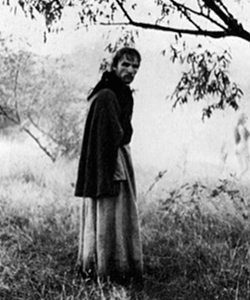Review: Japanese Summer Double Suicide (1967)
Japanese Summer: Double Suicide starts with drones of disenfranchised masses painting over the graffiti covered walls of public bathrooms and whitewashing away any semblance of individuality from the increasingly desolate landscapes of a sparsely occupied urban Japan. This film occupies a purposely obfuscated time and place, and we get no indication of the chain of events that has set off the prevailing attitudes of heightened paranoia and repressed sexuality. Soldiers march across the landscape in lockstep formation and a lone youth stands in diametric opposition of the overwhelming sea of faceless denizens of government sponsored conformity. The sexually repressed Japanese woman stands in an unspoken opposition to these forces, and her silent defiance is only broken when she tries to engage the soldiers to satiate her unfulfilled sexual desires. This wasn’t the last time that Oshima had used such imagery to illustrate disillusionment with a Japanese government that had failed its idealistic youth. He would later employ a similar scene in In the Realm of the Senses.
The young woman finally finds a soldier to break away from the pack, but he is too preoccupied with burning feelings of righteous indignation to engage her sexually as she so desperately desires. They wander the post apocalyptic landscape in a desperate attempt to find somewhere to fit in, or somewhere that their passions can be channeled in to something productively destructive, but they are haunted by the chalk outlines of dead lovers burned in to the highway like scorched shadows after the annihilation of a nuclear holocaust. They encounter many such imprints of the citizens of a bygone era, long dead and casting permanent shadows against the desolate urban landscapes. The only other living people that they encounter on their journey are either gangsters or soldiers, as these two factions seem to infect every corner of scorched earth. In a landscape of gangsters and soldiers, the only virtuous individuals are the two sexually repressed youths, but they are too clueless to realize the significance of their apathetic rebellion.
Oshima employs various methods to alienate the viewer, and rarely affords us the context to put together a mental image of “place”, or a coherent timeline to cling to. This purposeful alienation drives us to the same feelings of desperation and hopelessness that our young protagonists are feeling. It creates a disorienting effect that illustrates the disorientation of an entire lost generation that is trying to reestablish itself in impossible times. One gets a distinct Bunuel vibe, particularly elements of The Exterminating Angel as a small band of gangsters and ex-soldiers find themselves unable to leave, or find a worthwhile purpose to aim their unchanneled aggression and energy toward. There are also strong hints of Godard’s influence again as the base elements of guns, gangsters, and girls are used as subversive elements to illustrate societal conditions where humanity is stripped down to its base survival elements.
High contrast lighting and long shadows contribute to angular compositions and visual tension without the need for much action. These long shadows are cast by the setting sun of the Japanese society that is awaiting a rebirth. These tense compositions illustrate the brooding force that lives inside of men of action that are forced to inaction as they wait. They wait for the genesis of cohesive leadership to direct their malaise in to useful actions. Television is offered as a government issued pittance to satiate the unharnessed energies of these disillusioned men, but only serves to create more conflict. Meanwhile women wait for men to overcome their malaise and once again find a set of priorities that aligns sex ahead of guns.















 Review: The Greatest Movie Ever Sold (2011)
Review: The Greatest Movie Ever Sold (2011) Review: Space Cowboys (2000)
Review: Space Cowboys (2000) Review: The Yellow Sea (2010)
Review: The Yellow Sea (2010) Review: The Texas Chainsaw Massacre (1974)
Review: The Texas Chainsaw Massacre (1974) Review: True Crime (1999)
Review: True Crime (1999)



